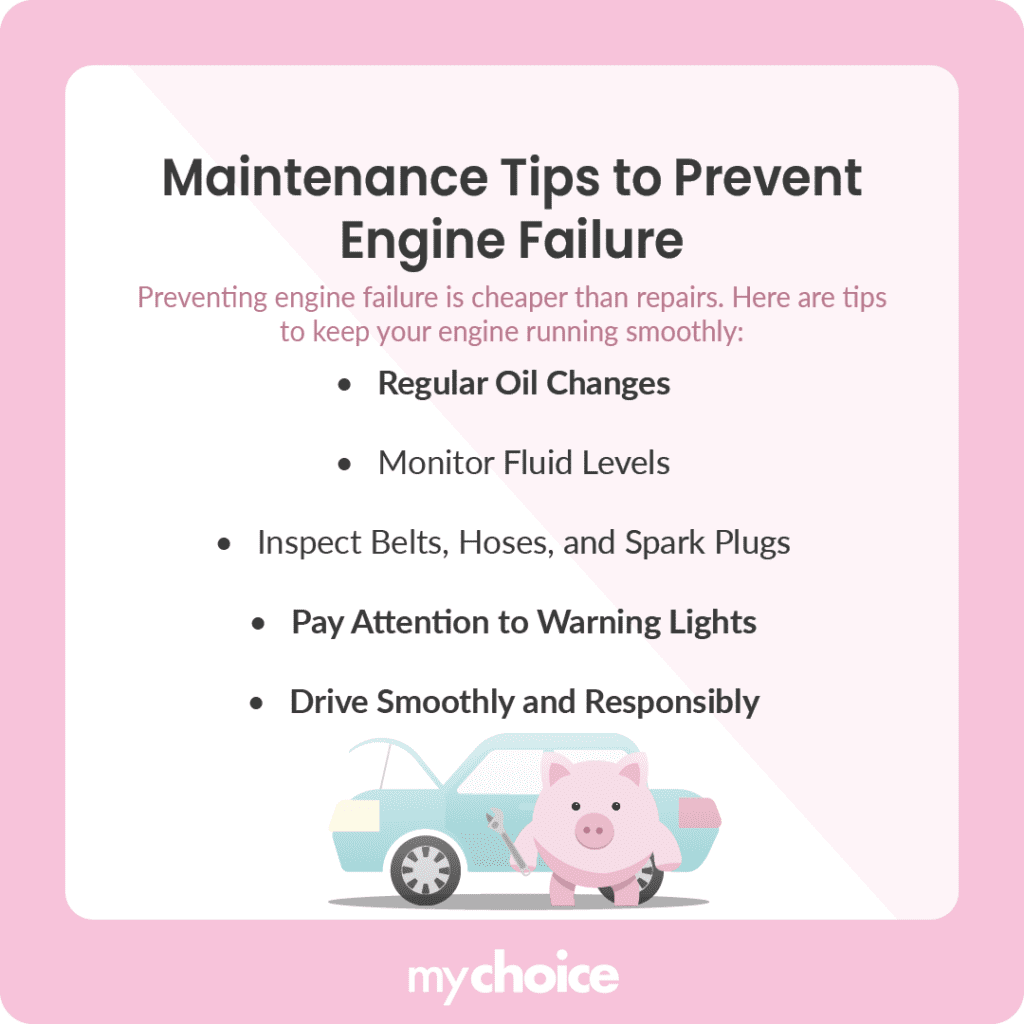Engine failure is a dreaded scenario that occurs more commonly than you think. A broken down engine can leave your car completely inoperable and cost a ton in repair costs, so it’s natural to wonder whether your insurance policy will cover engine failure. Read on to find out which situations your insurance policy will cover your repair costs and what other options can cover an engine failure.
What Type of Car Insurance Covers Engine Failure?
Familiarizing yourself with the basics of auto insurance in Ontario is an important step to understanding whether your policy covers engine failure.
Before you can legally drive in Canada, you need to have an auto insurance policy. The type of coverage you have on your policy dictates what kind of damage is covered by your insurance policy.
| Engine damage source | Collision coverage | Comprehensive coverage | All perils coverage |
|---|---|---|---|
| Collisions | Covered | Not covered | Covered |
| Natural disasters | Not covered | Covered | Covered |
| Vandalism | Not covered | Covered | Covered |
| Theft | Not covered | Covered | Covered |
In general, standard auto insurance policies do not cover engine failure unless it results from a specific incident that is covered by your policy. If your engine fails due to wear and tear, lack of maintenance, or other preventable issues, your auto insurance will likely not cover the costs. Insurers typically view maintenance as the owner’s responsibility, so engine failures resulting from neglect are not covered.
What Causes Engine Failure?
Engine failure can occur for a variety of reasons, and understanding these causes can help you prevent costly repairs. Here are some of the most common culprits:
Understanding these causes is vital since many of them can be prevented with proper care and maintenance.
What Other Options Cover Engine Failure?
If you’re concerned about engine failure and want additional protection beyond standard auto insurance, consider either mechanical breakdown insurance (MBI) or extended warranties. These options can better guarantee the coverage of your vehicle’s repairs when an engine failure does happen.
Mechanical breakdown insurance is designed to cover repairs for mechanical failures that are not the result of accidents. This includes issues that arise from normal wear and tear such as transmission damage or engine failures. However, not all insurers offer MBI, and eligibility may depend on the age and mileage of your vehicle.
If you’ve just bought your car, you have the option to purchase an extended warranty from the dealership or manufacturer. These warranties can provide coverage for engine repairs after the original warranty expires, but they often come with specific terms and conditions.
Choosing Between Mechanical Breakdown Insurance and Warranties
When deciding between mechanical breakdown insurance and extended warranties, there are a few factors you should consider.
Cost is usually the biggest consideration when choosing between MBI and extended warranties. MBI is generally less expensive than extended warranties. For example, MBI premiums can range from $50 to $150 per year, while extended warranties can cost anywhere from $1,500 to $6,000, depending on the coverage.
MBI typically covers a broader range of mechanical failures, while extended warranties may have more exclusions with specific conditions. Review the fine print of each option to understand what is and isn’t covered. Additionally, MBI often allows you to choose your repair shop, whereas extended warranties may require you to use specific service providers.
MBI usually comes with a deductible, while many extended warranties do not. Consider how much you’re willing to pay out-of-pocket for repairs. Ultimately, the best choice depends on your vehicle’s age, your budget, and how much risk you’re willing to take on.
Maintenance Tips to Prevent Engine Failure
Preventing engine failure is often easier and cheaper than dealing with repairs. Here are some maintenance tips to keep your engine running smoothly:

By following these tips, you can help extend the life of your engine and reduce the likelihood of costly failures.
Key Advice From MyChoice
- Regularly check your engine and perform maintenance to minimize the risk of an engine failure.
- Consider purchasing mechanical breakdown insurance or an extended warranty for your vehicle if you’re worried about engine failures.
- Your regular insurance policy coverage will only cover engine failure if it’s a result of a collision or event you’re insured against.








